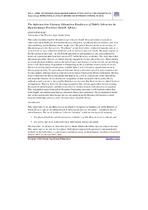| dc.description.abstract | This study examines if public libraries in a province in South Africa are ready to assume an
enhanced responsibility for information literacy education, specifically that of students, and, if so,
what inhibiting and facilitating factors might exist. The public libraries in the rural province of
Mpumalanga provide the case site. “Readiness”, at one level, refers to physical capacity and, on a
second level, to more subjective attributes such as staff attitudes and beliefs. The paper reports on
the first phase of the study – in which both quantitative and qualitative data were gathered by
means of a questionnaire/interview survey of 57 public librarians in 46 sites. The study finds that
Mpumalanga public libraries are indeed heavily engaged in serving school learners. Shortcomings
in certain physical facilities, such as the lack of space and absence of retrieval tools, are inhibiting
factors with the heritage of apartheid still impacting on the availability of and quality of service.
The low level of professional education of public library staff is found to impede innovation in
library programming. The prevailing information literacy education model largely comprises oneto-
one support, although there is a fair amount of source-based group library orientation. Moving
towards information literacy education will depend on a shift in conceptions of the educational
role of public libraries. In the absence of recognition of their curricular role by public library
authorities and educators, many public librarians are not sure that their services to school learners
are legitimate. There is, however, dawning recognition that present approaches are not meeting
the needs of school learners and that more effective communication with educators is required.
This recognition comes from public librarians’ frustrating encounters with learners rather than
from insight into information literacy education theory and experience. The fundamental conclusion
is that sustainable information literacy education in public libraries will depend on more
dynamic leadership and on a vision of a new model of public library. | en_US |

